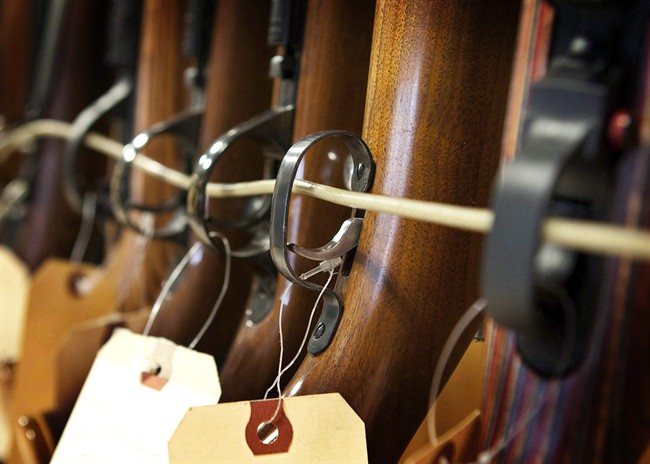OTTAWA – Gun owners may never know if their registration records have been secreted away by the RCMP once the Conservative government creates what the federal information commissioner is calling a legislative “black hole.”

The explosive allegation from Suzanne Legault came as she pleaded with parliamentarians to strip retroactive gun registry changes from an omnibus budget bill in order to avoid setting a “dangerous precedent” for Canadian democracy.
And in a signal of non-confidence in both the RCMP and the Harper government, Legault filed a preservation order Wednesday in Federal Court to prevent the government from destroying more contested gun registry records.
READ MORE: Want to work with what’s left of the long gun registry? Download it here
Amendments buried in the latest omnibus budget bill go far beyond the original 2012 law to simply end the long-gun registry and delete the records, Legault told the Senate finance committee.
“It will effectively erase history,” said Legault while disputing government claims the changes merely close a “bureaucratic loophole.”
“Rather,” she said, “it is an attempt to create a black hole.”
At issue are legal changes – backdated to the day in 2011 that the bill to end the gun registry was first introduced rather than when it actually passed – that will exempt and nullify not just registry data from the Access to Information Act, but all documents related to the registry’s destruction.
The unprecedented rewrite of the law also nullifies any jurisdiction over the documents for Legault and even the Federal Court.
READ MORE: Bring all branches of government under information law, watchdog urges
“This probably means that no one will be able to request information about whether the RCMP has really deleted his or her information from the registry, or about how much the destruction of the registry cost Canadian taxpayers,” she said.
For some hardcore gun enthusiasts who remain convinced the RCMP used old registry records to target gun owners’ homes in High River, Alta., during devastating floods in 2013, Legault’s comments come as grim confirmation.
“That’s what I’ve been saying all along,” Dennis Young, a former Reform party staffer on Parliament Hill who is an honorary life member of the country’s two biggest gun organizations, said in an email. “Nice to have the expert confirm it.”
Legault said she has no evidence the RCMP continues to hold secret copies of the registry outside Quebec.
READ MORE: Analysis: Why Quebec faces a difficult task in rebuilding its long gun registry
But she also expressed zero confidence in the national police force telling the truth about the records. “I can’t confirm 100 per cent what the RCMP did or didn’t do.”
RCMP deputy commissioner Peter Henschel, who appeared at the committee after Legault, said the Mounties sought out all paper copies of the registry after deleting the electronic version.
The RCMP has previously said there was no cost to deleting the registry but Henschel said they spent months developing and testing an “algorithm” to root out the records from what he called “a very complex database.”
He also said the RCMP didn’t ask for the backdated legal help in sealing all documents related to the destruction.
“We were neither consulted nor involved in this legislation,” said Henschel.
The Mounties maintain they provided all the data from the registry records they were required to under the access-to-information rules – a matter of interpretation that Legault says she’d be happy to argue in court.
“If the government’s position and the RCMP’s position is that everything that happened is way above board – everything they did is legal, and I am wrong – then let the police investigate the matter,” said Legault.
“Why are we doing this? We’re actually passing a retroactive law that will nullify any record that exists over everything that happened in this file.”
Her comments spurred a sharp exchange Thursday in the Commons, where New Democrat Charlie Angus said the Conservatives have moved beyond undermining independent officers of Parliament and are “actually trying to retroactively fabricate the will of Parliament to aid in its latest coverup.”
Roxanne James, the parliamentary secretary for public safety, said the government rejects “any claim that the RCMP did anything wrong by following the express will of Parliament.”
The budget bill is on the fast track to be passed by Parliament within days before the rise for the summer recess and a fall election call.
Legault recommended two months ago that charges be laid against the Mounties for their role in withholding and later destroying registry records, which were subject to an active access-to-information request, before Parliament had passed the law ending the long-gun registry in April 2012.
The Ontario Provincial Police have since begun an investigation of the RCMP actions after receiving the file from the Office of the Public Prosecutor.

Comments